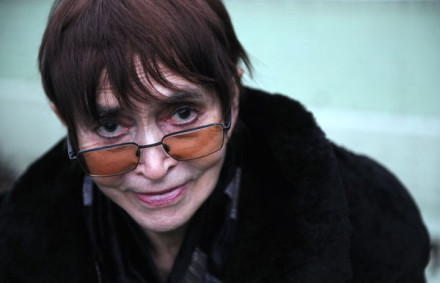Věra Chytilová (1929-2014)
The great Czech filmaker Věra Chytilová has died at age 85. She is remembered in Fandor (which is also where I found this clip from her masterpiece “Daisies”) by David Hudson:
“The director and screenwriter Věra Chytilová, the first lady of Czech film, died today in Prague at the age of 85,” reports the Prague Post. “As a filmmaker, Chytilová already made news with her student films, Ceiling (Strop, 1961) and A Bagful of Fleas (Pytel blech, 1962), but it was her provocative 1966 film Daisies (Sedmikrásky) that made her a household name in then-Czechoslovakia, even at the height of the otherwise male-dominated Czech New Wave that included such luminary figures as Miloš Forman and Jiří Menzel.”
“She was unique in the history of Czech cinema as a high-profile director during the New Wave, Normalization, and post-Communism periods who did not pursue a filmmaking career outside the country,” notes Kevin McFarland at the AV Club. “Chytilová didn’t simply represent a female presence in a male-dominated cinematic movement; she stood out as the most vocally political and aesthetically experimental filmmaker of the bunch.”
The AP notes that Daisies “proved her reputation as a provocateur and helped establish her as an artistic force at home and abroad. Like the movies of other new Czech directors of the time, it represented a radical departure from socialist realism, a typical communist-era genre focusing on realistically depicting the working class’ troubles. The heroes of Daisies—two teenage girls—decide to get spoiled because the entire world is spoiled, and they want to have some fun. It was immediately banned before winning the Grand Prix at the Bergamo Film Festival in Italy in 1967…. Of her 20 feature movies, her major works include Fruit of Paradise, Calamity, Panelstory, The Very Late Afternoon of the Faun and The Inheritance.”
“Choleric, diabolically crazy, aggressive, ironic, sarcastic, inflexible and arrogant—just a few of the phrases used by the Czech media to describe her after she collected her prize,” noted Kate Connolly in a profile for the Guardian in 2000. “Some who know her say these characteristics stem from a bitterness she shares with others of her generation, who spent the best years of their lives working under a totalitarian regime. She describes herself as an ‘overheated kettle that you can’t turn down,’ but puts it down to impatience. ‘You always have to work as if what you’re working on could be your last,’ she says. ‘I want to move on, even if I have to crawl.’ Chytilová cultivates the art of being deliberately ruthless. ‘I have no desire to cuddle my audience,’ she emphatically states.”
“On the surface, Daisies’ assemblage of outlandish scenarios enacted by two ferociously antiestablishment figures would seem to mark it as simple anarchic slapstick, like a New Wave Marx Brothers comedy,” suggested Criterion’s Michael Koresky in 2012. “But Chytilová has called her film ‘a philosophical documentary in the form of a farce.’ … By refusing to cultivate a psychological connection between audience and character, and by confounding any sense of narrative momentum, Chytilová and her screenwriting partner Ester Krumbachová create protagonists who seem to have no future or past. Blank slates, they have been interpreted over the years variously as embodiments of healthy rebellion and the banality of evil. Either way, they are good representations of Chytilová’s belief that ‘people are primitives and aesthetes at the same time.’”
“Chytilova continued to make films into the 2000s, but Daisies remains her best-known work,” wrote Nicolas Rapold in the New York Times, also in 2012. “‘You don’t really begin working creatively until you are at a point where you don’t know,’ she said a year after making Daisies. Today her film still has that fresh, try-anything outlook.”


 Poasis II: Selected Poems 2000-2024
Poasis II: Selected Poems 2000-2024 “Todesguge/Deathfugue”
“Todesguge/Deathfugue” “Interglacial Narrows (Poems 1915-2021)”
“Interglacial Narrows (Poems 1915-2021)” “Always the Many, Never the One: Conversations In-between, with Florent Toniello”
“Always the Many, Never the One: Conversations In-between, with Florent Toniello” “Conversations in the Pyrenees”
“Conversations in the Pyrenees” “A Voice Full of Cities: The Collected Essays of Robert Kelly.” Edited by Pierre Joris & Peter Cockelbergh
“A Voice Full of Cities: The Collected Essays of Robert Kelly.” Edited by Pierre Joris & Peter Cockelbergh “An American Suite” (Poems) —Inpatient Press
“An American Suite” (Poems) —Inpatient Press “Arabia (not so) Deserta” : Essays on Maghrebi & Mashreqi Writing & Culture
“Arabia (not so) Deserta” : Essays on Maghrebi & Mashreqi Writing & Culture “Barzakh” (Poems 2000-2012)
“Barzakh” (Poems 2000-2012) “Fox-trails, -tales & -trots”
“Fox-trails, -tales & -trots” “The Agony of I.B.” — A play. Editions PHI & TNL 2016
“The Agony of I.B.” — A play. Editions PHI & TNL 2016 “The Book of U / Le livre des cormorans”
“The Book of U / Le livre des cormorans” “Memory Rose Into Threshold Speech: The Collected Earlier Poetry of Paul Celan”
“Memory Rose Into Threshold Speech: The Collected Earlier Poetry of Paul Celan” “Paul Celan, Microliths They Are, Little Stones”
“Paul Celan, Microliths They Are, Little Stones” “Paul Celan: Breathturn into Timestead-The Collected Later Poetry.” Translated & with commentary by Pierre Joris. Farrar, Straus & Giroux
“Paul Celan: Breathturn into Timestead-The Collected Later Poetry.” Translated & with commentary by Pierre Joris. Farrar, Straus & Giroux